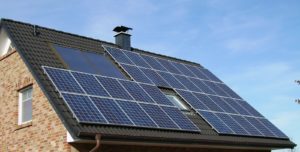Solar lights are a popular lighting option for homeowners. They’re easy to install, they don’t require any wiring or maintenance, and they produce bright light without the need for electricity. But there are some things you should know before installing solar lights in your yard or garden. Here’s an overview of four important considerations to make before purchasing solar lights.

What are solar lights and how do they work
Solar lights harness the sun’s energy during the day and store that energy in a rechargeable battery, which then releases light at night. The main benefit of solar lighting is its eco-friendliness. It doesn’t require electricity from power lines or gas from oil wells — it runs on free sunlight! Solar lights also tend to be safer because they don’t get hot like other types of outdoor lighting. In fact, most solar lights are cool enough to touch after hours of use.
Another advantage is cost savings: You won’t have to pay monthly electric bills for your solar garden lamps or yard spotlights, and you’ll save money when replacing batteries every couple of years (batteries last between two and three years). Plus, if you live in an area where it’s common for outdoor lights to be stolen, solar lighting is a good option because there isn’t any wiring that thieves can steal.
However, as with everything, there are some disadvantages to using solar lights. Solar lighting works best in areas with lots of sunlight, so it won’t be the right choice if you live somewhere that gets less than five hours of daily sun.
And while most solar lights have a small electric light sensor to turn on at dusk and off again at dawn, some don’t come on until it’s completely dark outside — which can mean a delay between when your house becomes bright enough for people to see from far away, and when they actually start seeing them.
How do I choose the best solar light for me?
Not all solar lights are created equal. When selecting the best solar lamp for your needs, look at its lumen output – which is a measure of how much light it produces.
A higher lumen count means brighter lighting for between five and eight hours after sundown each night (depending on where you live). There is a lot of lumen information at Ecavo lights reviews. You should also consider size when choosing a solar landscape light or spot right. Smaller lamps are usually better if you need to highlight individual plants or other features in your yard.
But keep in mind that larger lamps tend to cast more illumination over greater distances than small ones do, so they’re preferable if you want general outdoor lighting rather than focused beams.
Why should I install solar lights in my yard or garden?
Solar lights are great for lighting up walkways, driveways, and patios. They’re also a good option if you have a large yard or garden that doesn’t get enough direct sunlight to power regular electric lamps. If you live in an area where there are frequent power outages, solar lighting is also a good choice because you can keep your lamps powered during blackouts.
Many homeowners find that the cost savings associated with using solar lights more than outweigh any disadvantages of installing them in their gardens or yards. As long as you have at least five hours of daily sunlight, they’re worth considering for outdoor light needs! The costs of installing solar lights are often more than made up for by the savings from not having to pay electric bills. Solar lighting can be a great choice if you live in an area where it’s common for outdoor light fixtures to get stolen since there aren’t any wires that could be ripped out of them.
Solar light installation tips and tricks
If you’re new to solar lighting, here are some tips that can help make your outdoor light installation go smoothly:
- Before installing the lamp in the ground, test it out by hanging it from a branch or other solid object. This will give you an idea of how bright and where its beam shines before burying it.
- Make sure there are at least five hours of sunlight on your average day (more if possible) so the battery has enough power during nighttime use. If not, rechargeable batteries may need to be replaced more frequently than normal — every two years instead of three — which is something to think about when deciding whether or not this type of lighting is right for you.

Solar lights harness energy from the sun so you can enjoy bright, long-lasting outdoor lighting at night. They’re ideal if your yard or garden doesn’t get enough sunlight during the day to power regular electric lights and there are frequent blackouts in your area. But be sure that the lamps have a lumen count of 200 lumens per watt (or higher) for best results, otherwise, they won’t produce as much illumination as other types of lights might.





